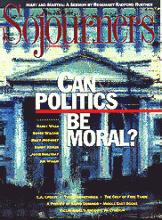THIS ELECTION campaign reminds me of Day of Abscence, a play produced some years ago by the Negro Ensemble Company. This drama depicted the chaos that occurred in a Southern town on the day that black folks just didn't show up. The situation this election cycle is a little different. We're around all right. It's just that the way the white folks are running the campaigns, you'd think we were absent from America.
For example, Bill Clinton took almost an hour to deliver his acceptance speech at the Democratic National Convention and somehow did not manage to utter the words black, civil rights, or racial justice. A month later George Bush took almost an hour to deliver his acceptance speech at the Republican National Convention and somehow did not manage to utter the words black, civil rights, or racial justice.
What a coincidence!
But don't get the idea that black people are not on the minds of politicians this year. The parties do manage to get their racial messages out. Pat Buchanan snarled his determination to take the country back "block by block." Guess from whom. And at the Democrats' convention a story came spinning out from deep in the bowels of the Clinton machine about how the ascendance of Ron Brown is a marker of the decline of Jesse Jackson. It was code for the preference that the reigning prince of the Democratic Party has for an organizational black, easily harnessed, as opposed to a black with a base of his own and an independent voice. Stories to this effect ran in both The New York Times and The Washington Post.
What a coincidence!
Read the Full Article

